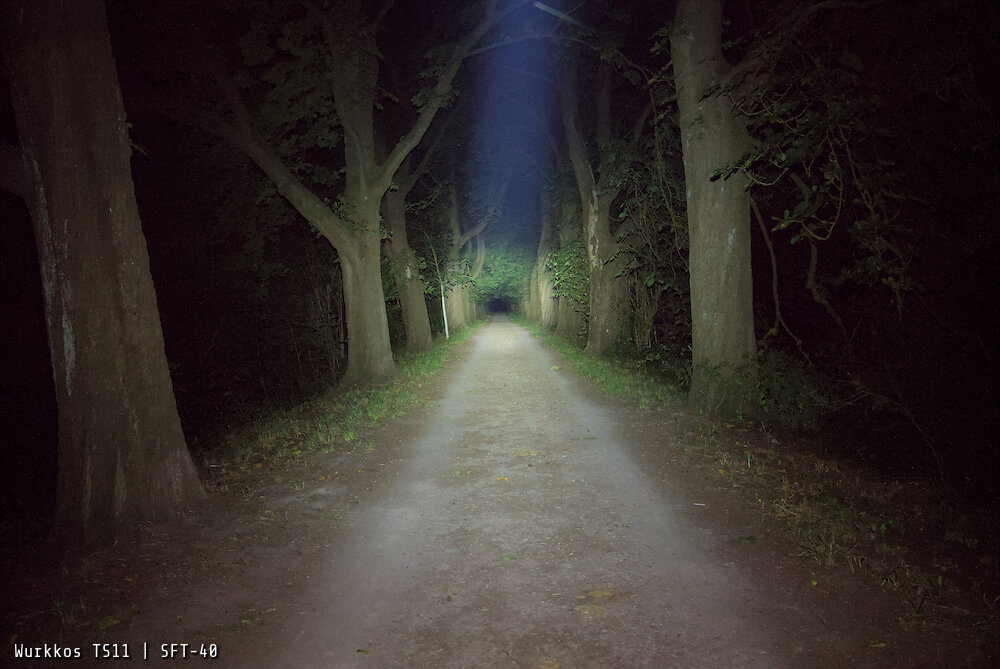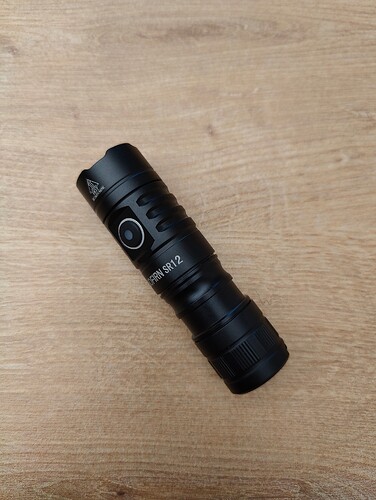Want to light up long distances with a flashlight suitable for EDC? At first glance, the new Sofirn SR12 doesn’t show its throw possibilities at all, but the deep reflector and the Luminus SFT-25R make it possible.
The flashlight becomes even more interesting when combined with an optionally available short battery tube for 18350 batteries. In this review, I have taken a brief look at the small pocket thrower.
You can find the German version of this review on my website: SammysHP Blog › Sofirn SR12
The flashlight was provided by the manufacturer for this review. Thank you very much!
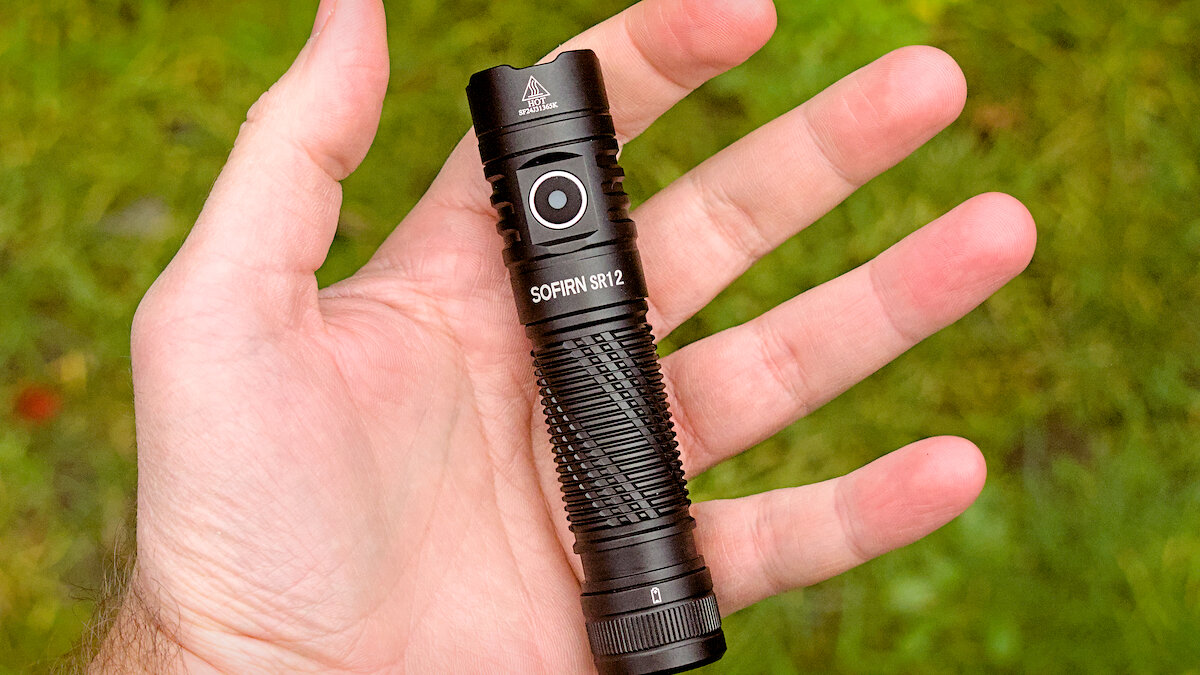
Overview of hardware
The flashlight is supplied in a sturdy cardboard box with magnetic closure. A novelty is the charging cable, which now has a USB-C plug on both sides. With previous flashlight models, a USB-A to USB-C cable was included.
- Sofirn 18650 Li-ion battery with 3000 mAh (unprotected, button-top, 3.86 V at arrival)
- Lanyard
- Clip
- 2x replacement o-rings
- USB-C to USB-C charging cable
- Manual
At the time of my test, the manual had not yet been completed, so I received a preliminary printout with the most important information.
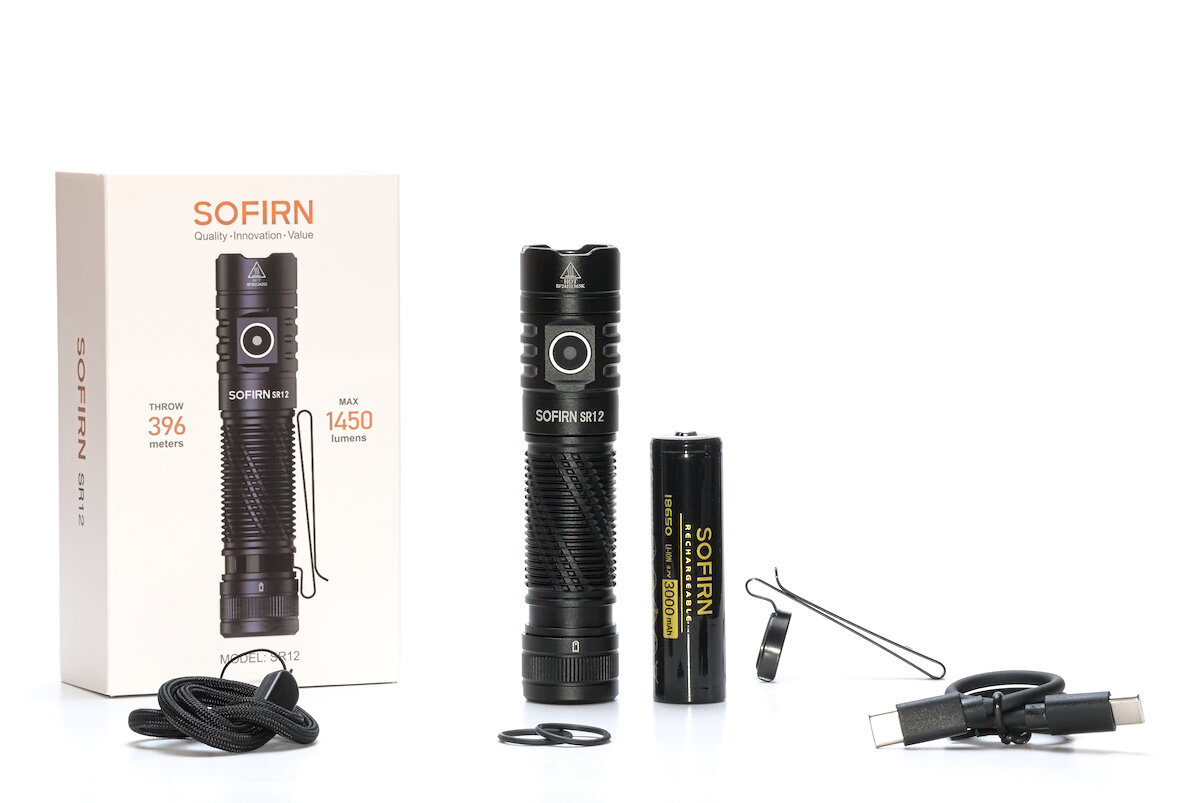
The dimensions of the SR12 are exciting. You would expect a flashlight with long throw to have a wide head that can accommodate a large reflector. With the SR12 however, the diameter remains almost the same from front to back.
Length: 112.8 mm
Diameter (head): 25.0 mm
Diameter (battery tube): 23.0 mm
Diameter (tailcap): 24.3 mm
Weight (without battery): 64.0 g
Weight (18650 battery): 45.7 g
Weight (total): 109.7 g
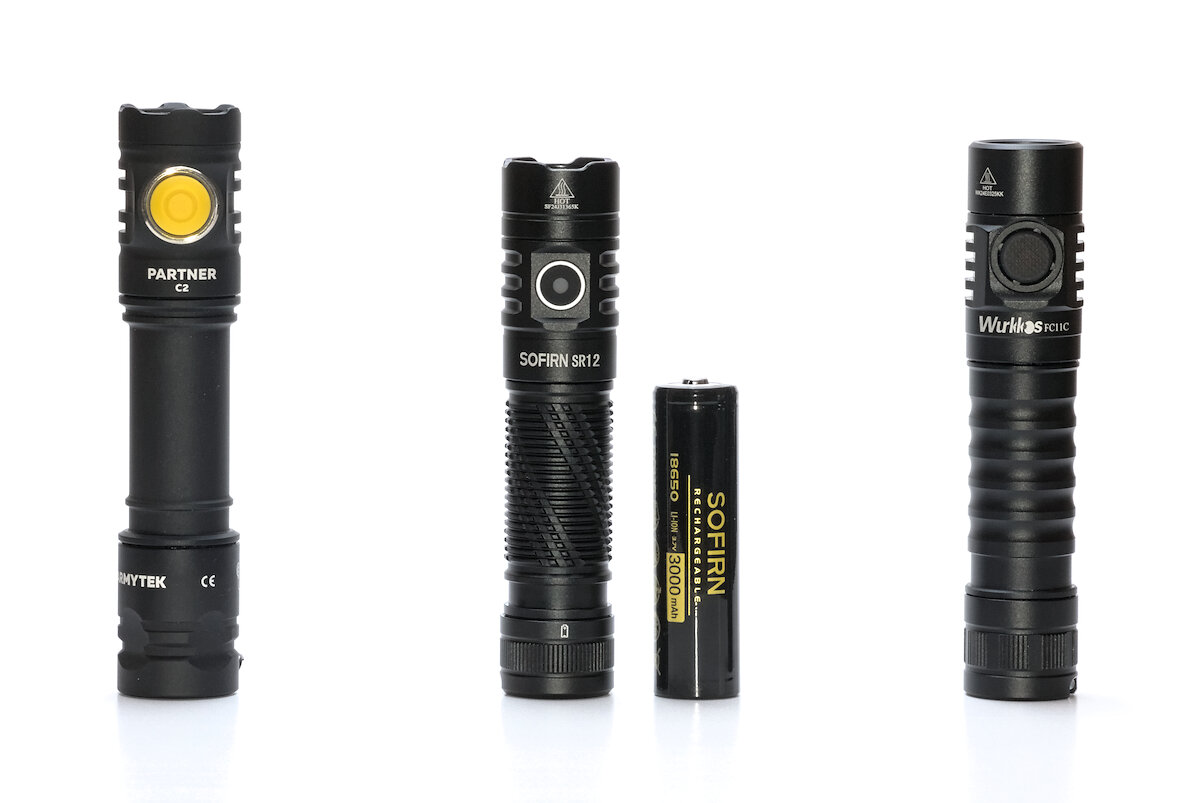
Armytek Partner C2 | Sofirn SR12 | Wurkkos FC11C
It is even a little shorter than the Wurkkos FC11C, which is more floody. You can also order the short 18350 tube from Sofirn or Wurkkos, which makes the SR12 around 33 mm shorter (79.7 mm).
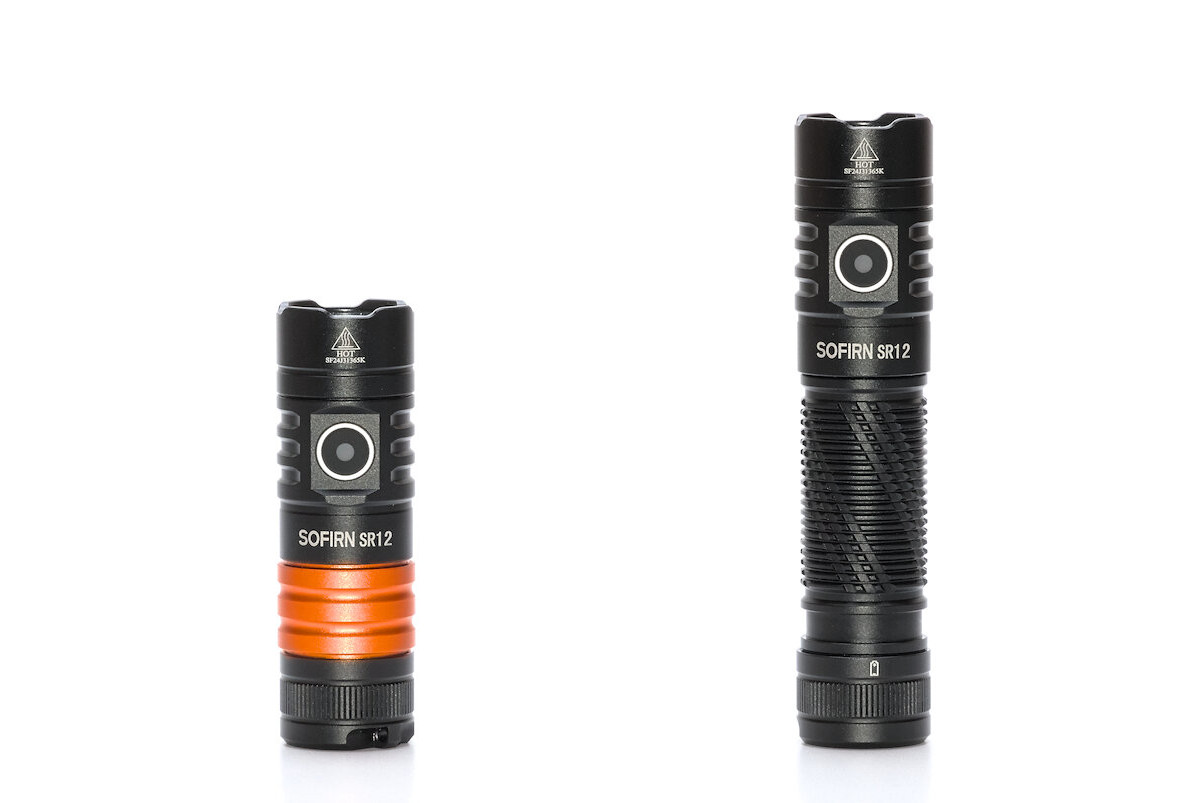
With short battery tube of the Wurkkos TS11 on the left side
Grooves with a helical pattern give the SR12 an interesting look and allow for a reliable grip even when wet. However, this design also makes the battery tube feel quite aggressive, although there are no really sharp edges.
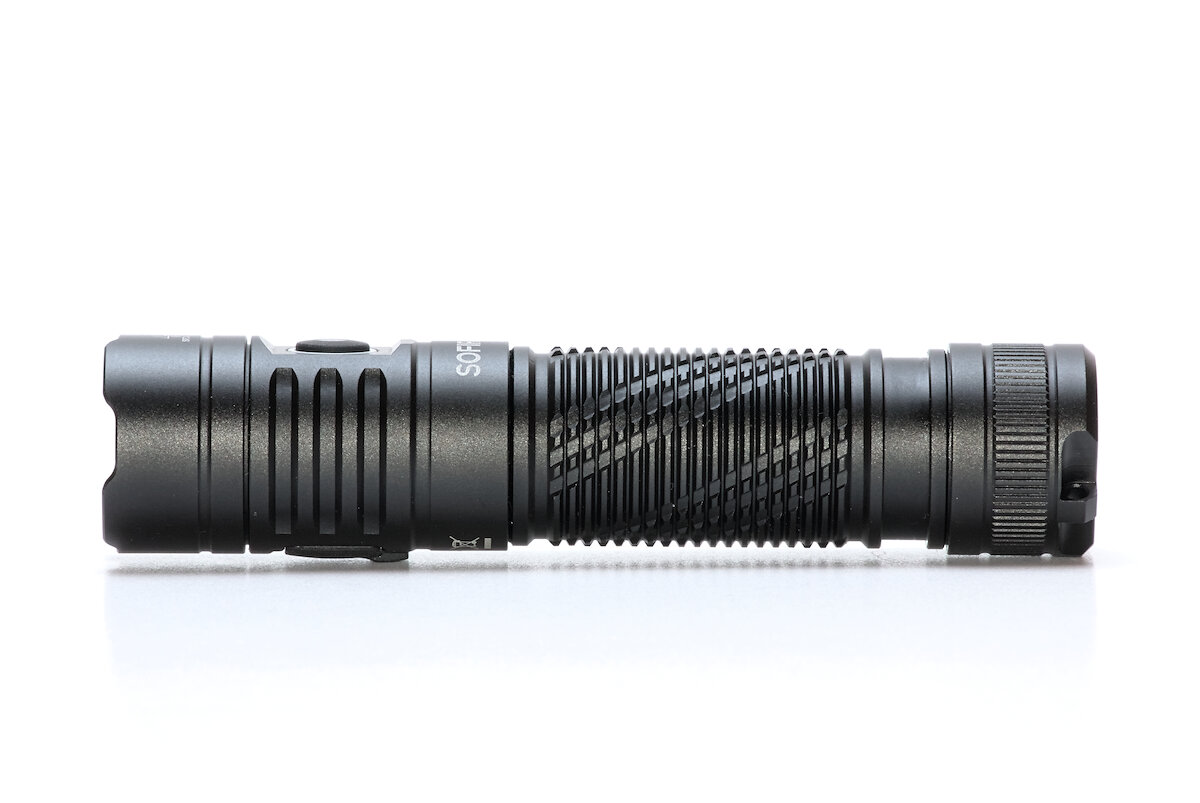
The bezel has a coarse crenelation, making it possible to see whether the flashlight is switched on when it stands on its head. There’s a hint of cooling fins next to the button, although these are more for design purposes.
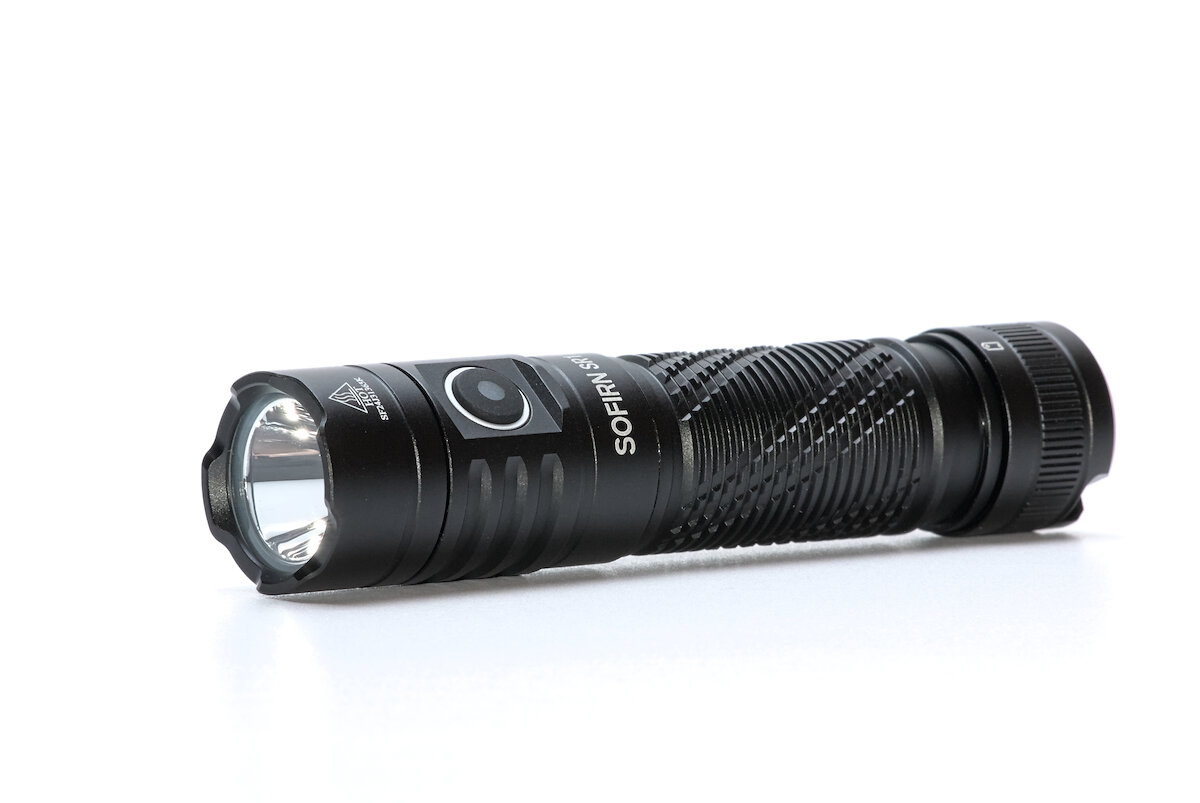
There is a hole on the tailcap for attaching a lanyard. However, the whole area is extremely sharp-edged. To protect the material of the lanyard, I recommend using a small key ring.
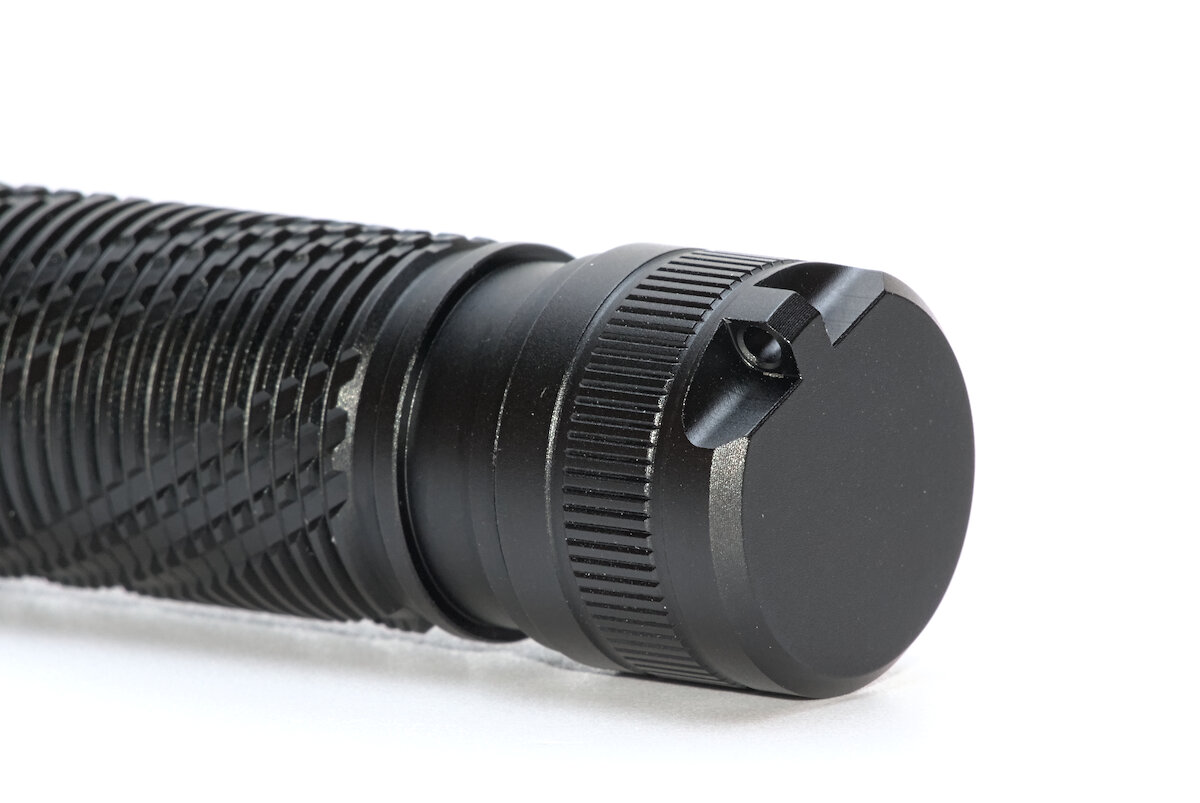
A magnet is also integrated in the tailcap, allowing the flashlight to be attached to magnetic surfaces. The magnet is strong enough to hold the flashlight horizontally. I tried to remove it, but it was too well glued.
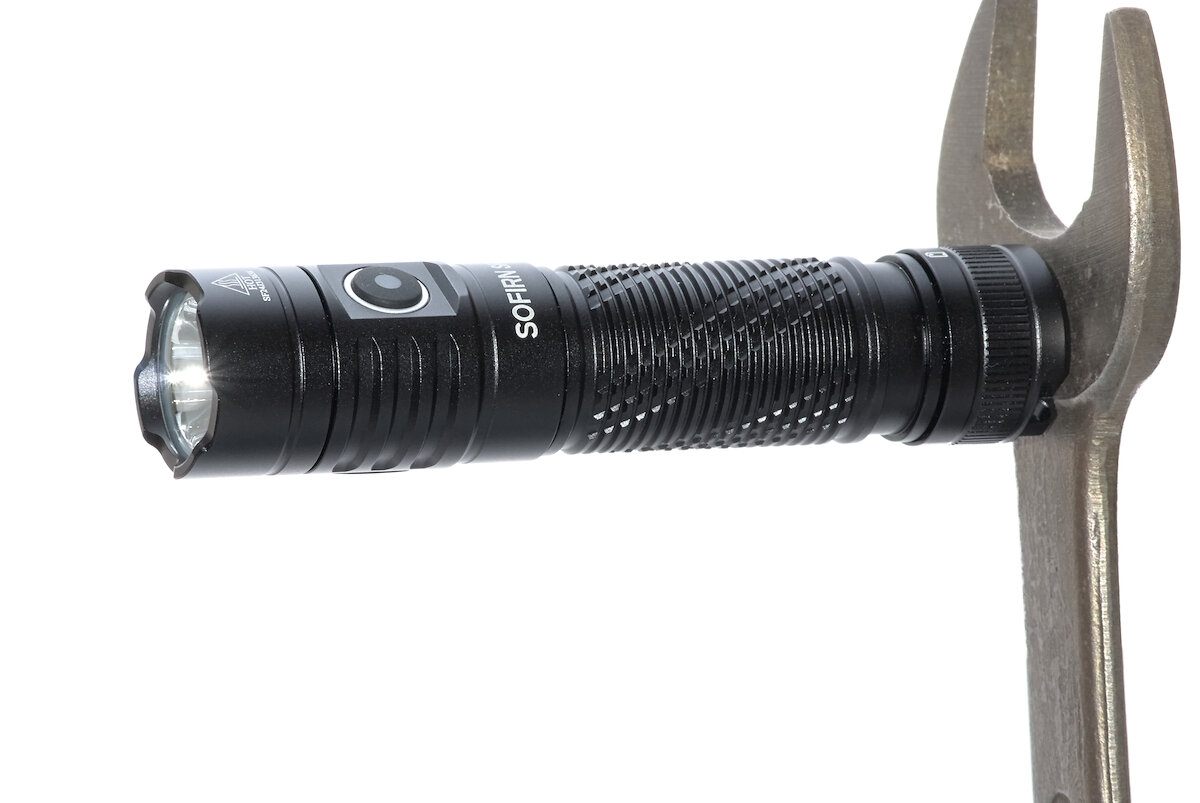
A two-way clip is included, which can be attached to the battery tube. It allows the flashlight to be carried relatively deep in the pocket. The battery tube and clip can also be reversed for even more flexibility.
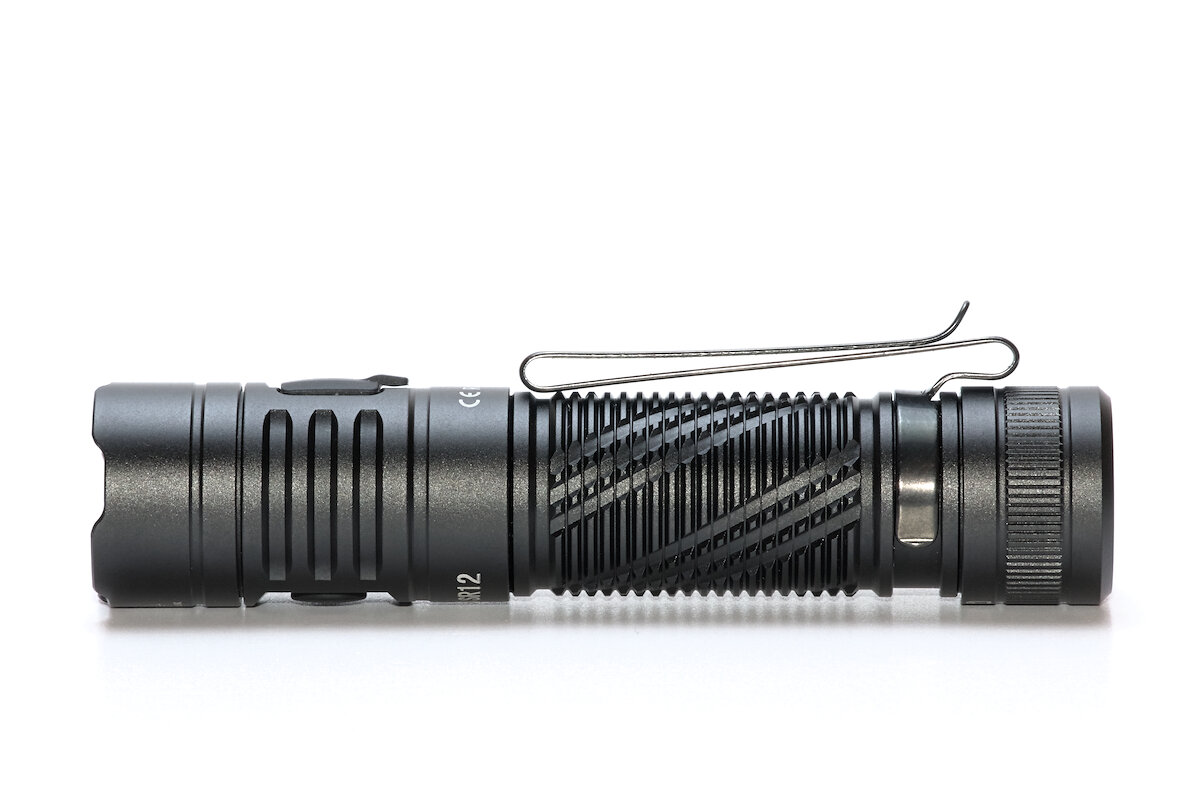
A USB-C port on the head allows the battery to be charged directly in the flashlight. The cut-out around the port is large enough to fit most USB cables. A silicone cover protects the port from water and dirt. A small tab helps with opening, but can also lead to accidentally opening the cover. I have therefore cut off the tab so that it is less likely to open accidentally.
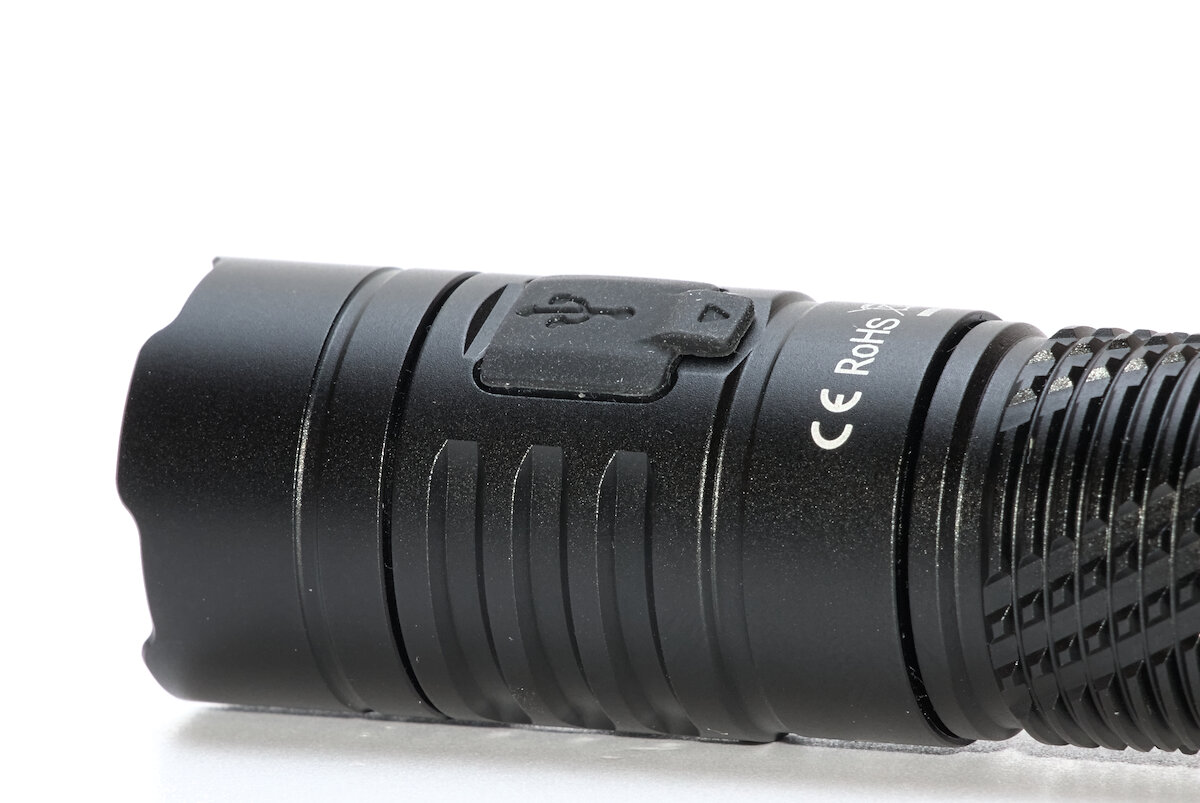
Charging is done at just under 2 A, meaning that the charging process is completed after around two and a half hours. A status LED in the button lights up red during charging and changes to green when charging is complete. The flashlight can be used without restrictions while it is connected to the charging cable.
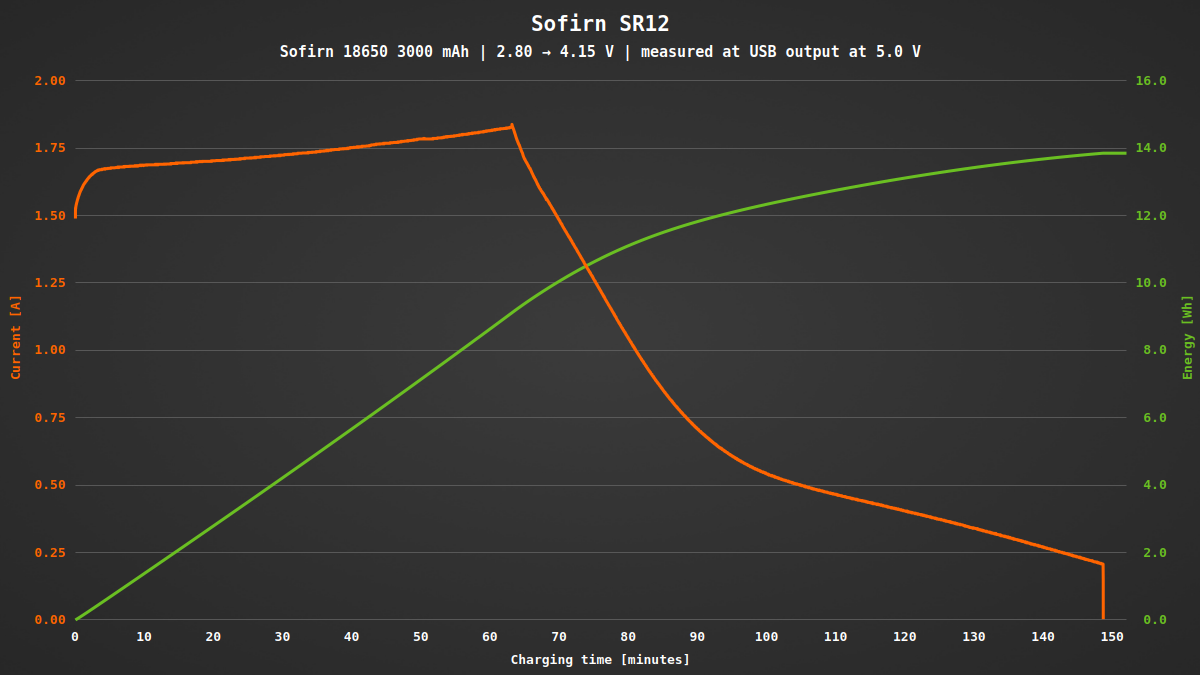
A spring in both the head and the tailcap ensures reliable contact with the battery. Batteries with a length of up to 70 mm fit, so most 18650 batteries should fit, from unprotected flat-top to protected button-top.
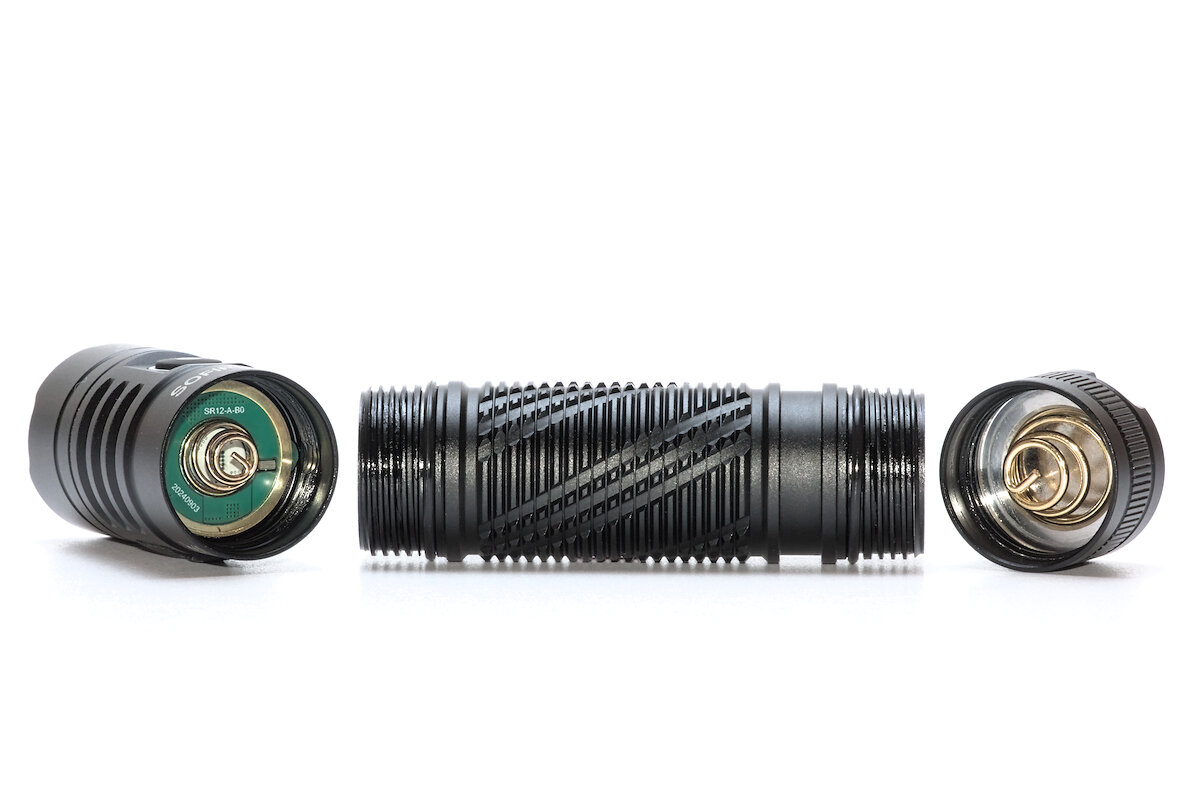
According to the specification, the SR12 is water-protected to IPX8 (with the addition “not for diving”) and should withstand drops from a height of up to one meter. The quality makes a very good impression, apart from the sharp edges on the tailcap.
User interface
The SR12 is operated via a button on the head of the flashlight. It has a soft surface and is located in a slight recess so that it does not protrude beyond the contour of the flashlight. It responds at around 450 to 700 g, depending on where and from which direction it is pressed.
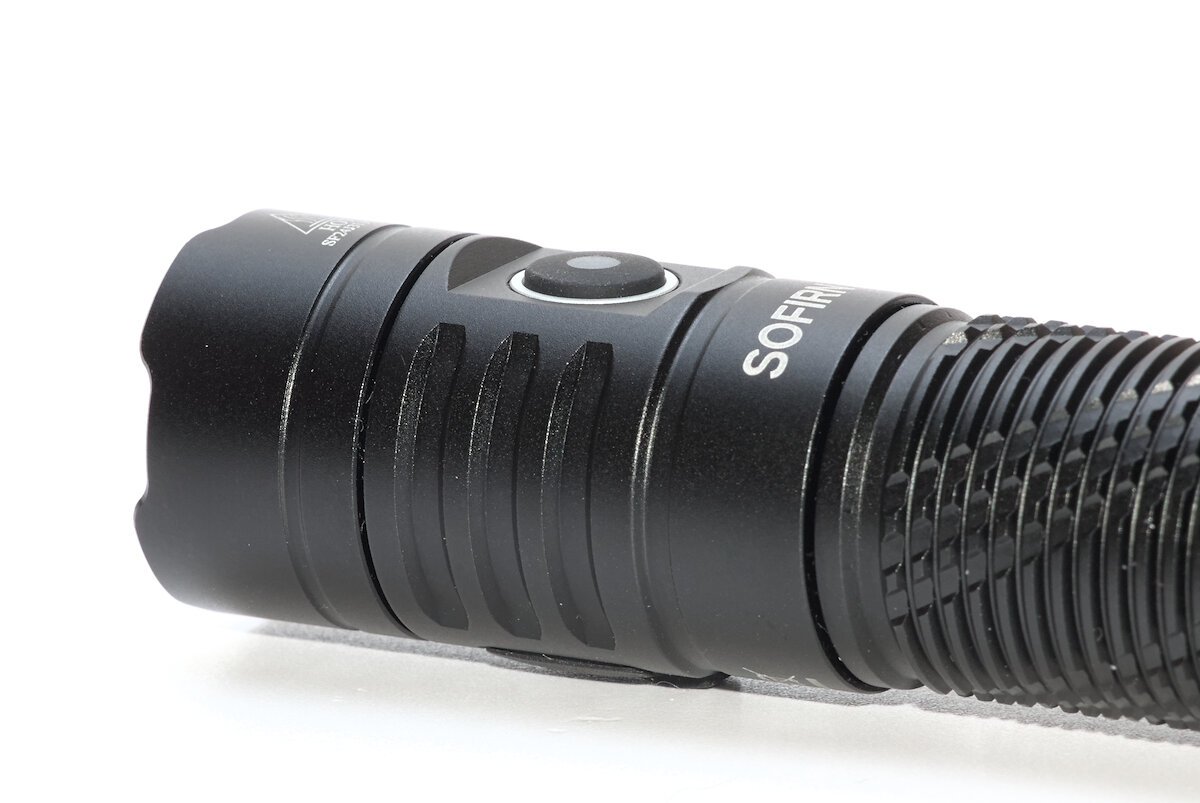
The user interface is straightforward and should be easy to understand. There are small differences compared to previous Sofirn flashlights. It no longer matters whether the flashlight was on or off before using turbo – a short click always switches back to the last brightness used.
| State | Action | Function |
|---|---|---|
| Off | 1 click | Turn on (last used brightness, except Moon and Turbo) |
| Off | 2 click | Turbo |
| Off | 3 click | Strobe |
| Off | 4 click | Lockout |
| Off | Hold | Moon |
| On | 1 click | Turn off |
| On | 2 click | Turbo |
| On | 3 click | Strobe |
| On | 4 click | Switch between stepped/smooth mode |
| On | Hold | Increase brightness (Eco → Low → Medium → High) or increase/decrease in smooth ramping mode |
| Turbo | 1 click | Previous brightness |
| Turbo | 2 click | Moon |
| Strobe | 1 click | Previous brightness |
| Strobe | 2 click | Turbo |
| Lockout | 4 click | Unlock and turn on in last used brightness |
| Lockout | Hold | Momentary Moon |
In smooth ramping mode mode the brightness is difficult to control as it does not follow the perceived brightness and allows little choice in the low range. There is also a bug in the firmware where the flashlight remains permanently switched on after the button has been held down for a moment in the locked state (only when smooth ramping is enabled).
The strobe changes its frequency every two seconds between 14 and 7 Hz at maximum brightness.
The backlight of the button indicates the approximate state of charge for five seconds after turning on the flashlight. If the battery voltage is below 3.2 V, the LED flashes red continuously when the flashlight is switched on.
| Color | State of charge |
|---|---|
| Green | 3.8 – 4.2 V |
| Green blinking | 3.5 – 3.8 V |
| Red | 3.2 – 3.5 V |
| Red blinking | < 3.2 V |
Overall, the SR12 feels good in the hand, but a little scratchy due to the battery tube. You sometimes have to search for the button. When not in use, the flashlight should be locked to prevent it from being accidentally switched on in your pocket.
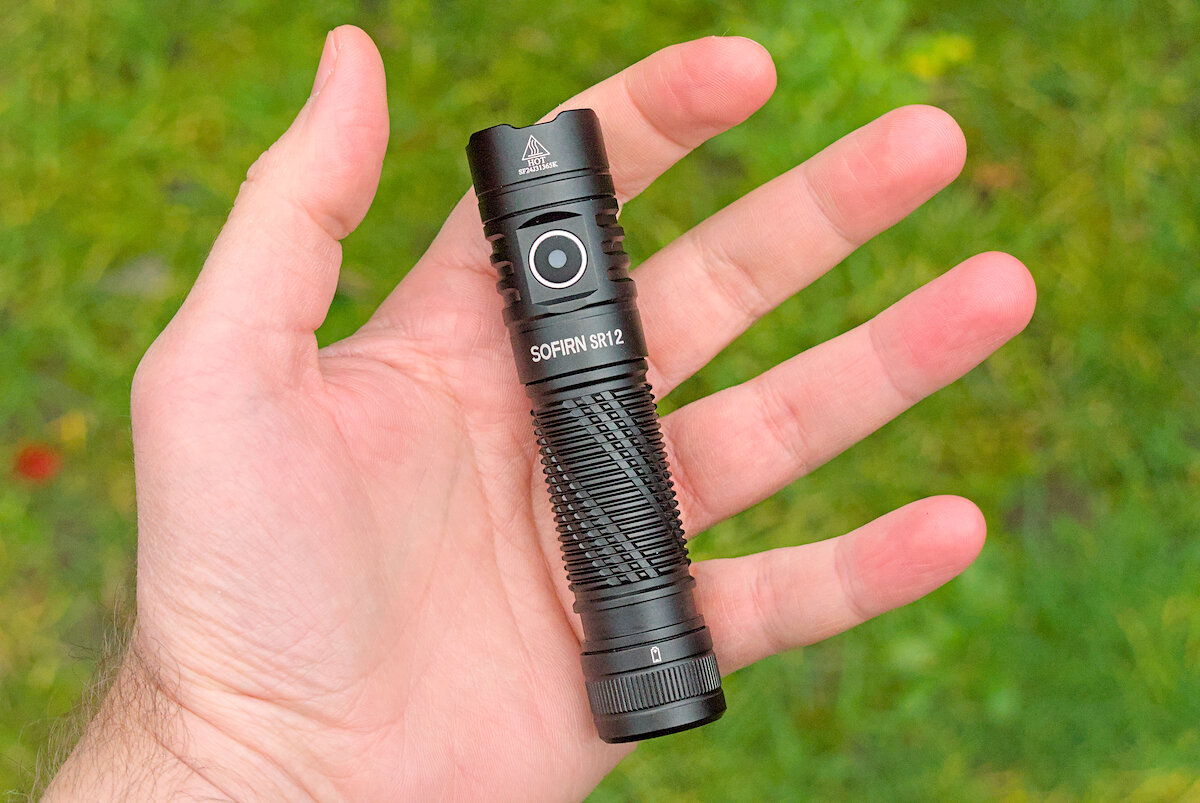
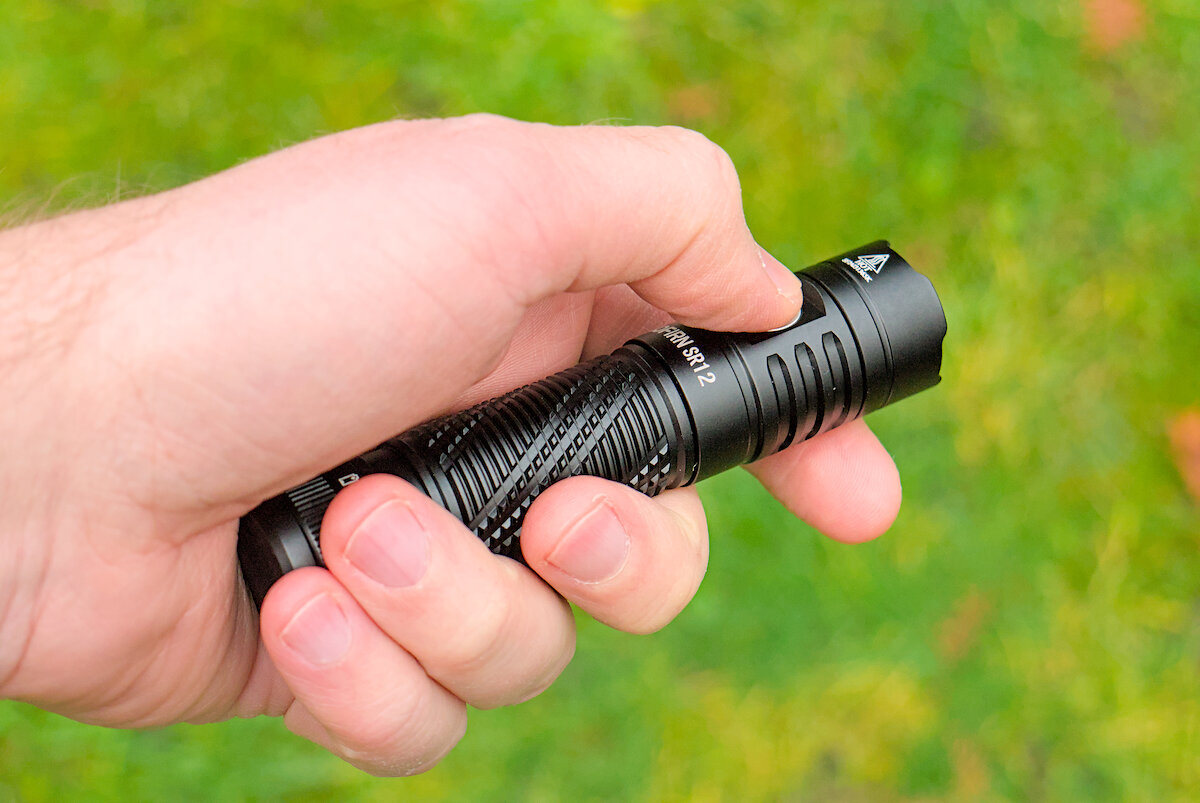
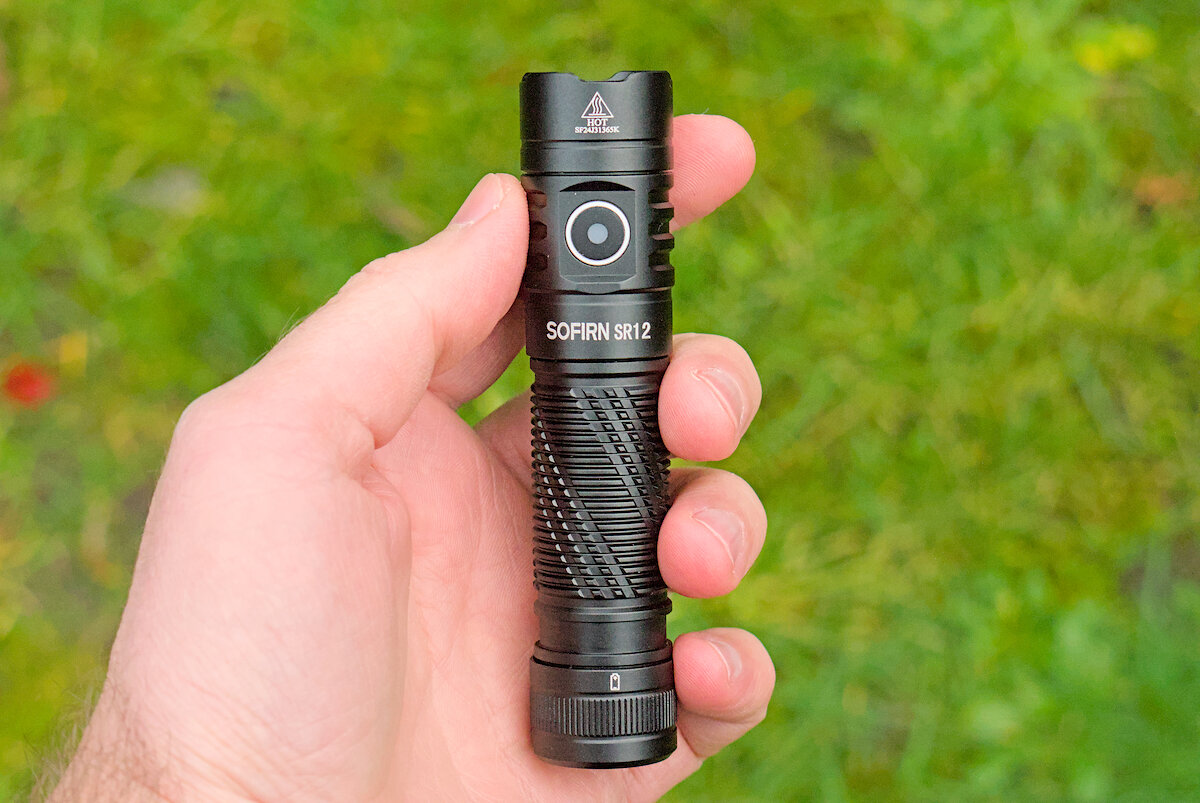
Illumination
To make the long throw possible in this small light, a Luminus SFT-25R is used, which is easy to focus thanks to its small and round light emitting surface. However, there’s also a small compromise: Currently the LED is only available in a cool white color with low CRI.
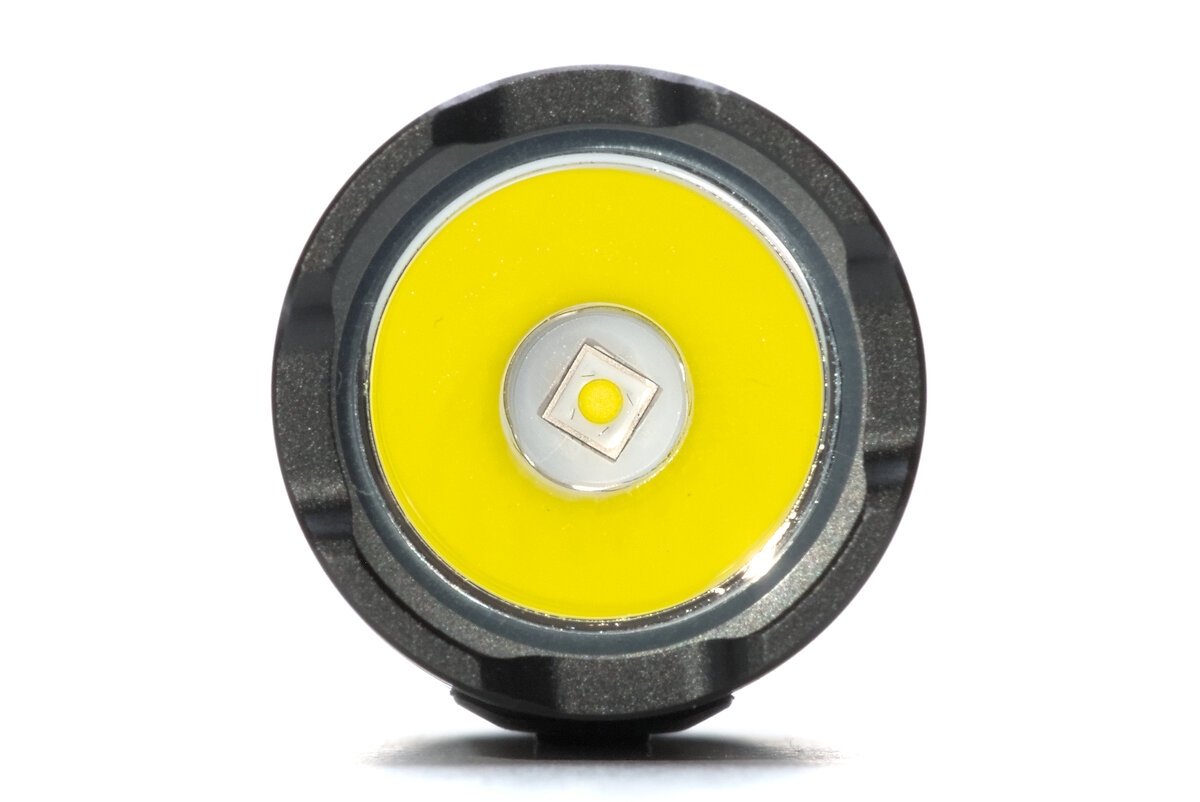
The LED is located in a smooth reflector, which is protected by a glass without anti-reflective coating.
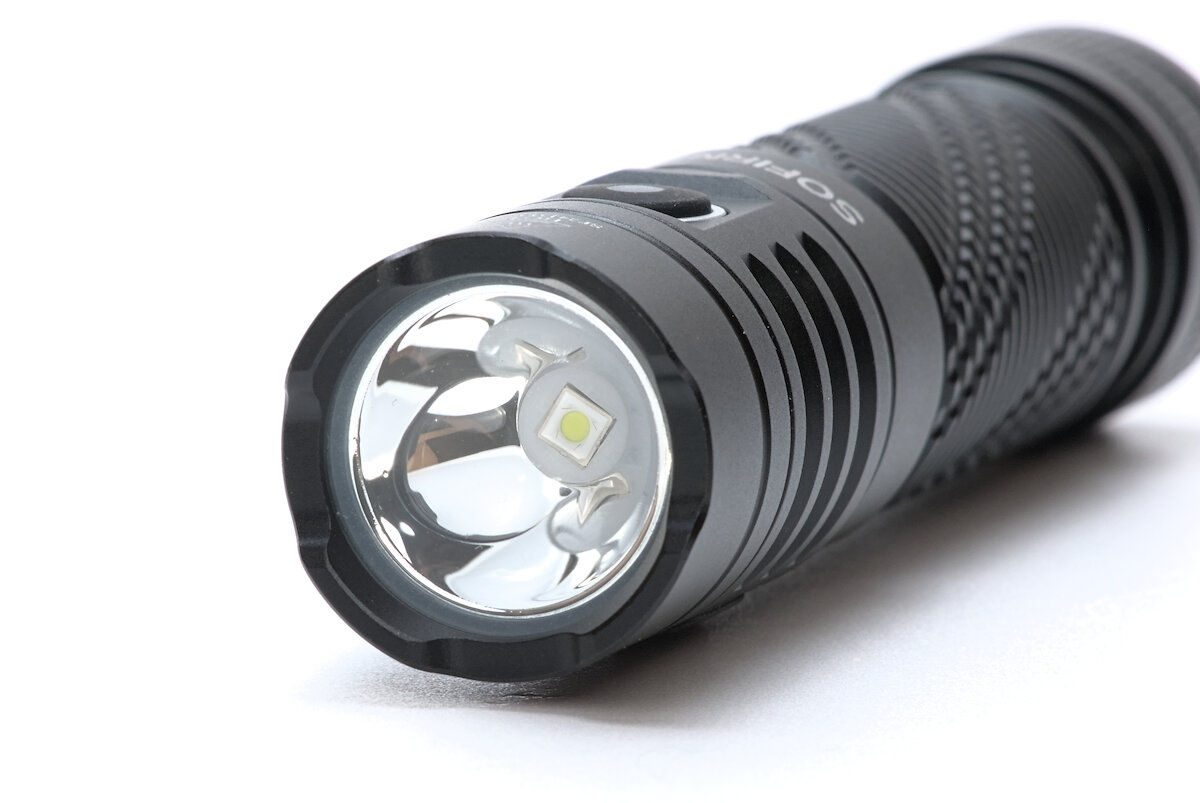
Interesting detail: The O-ring that seals the glass glows in the dark! But only for a few seconds.
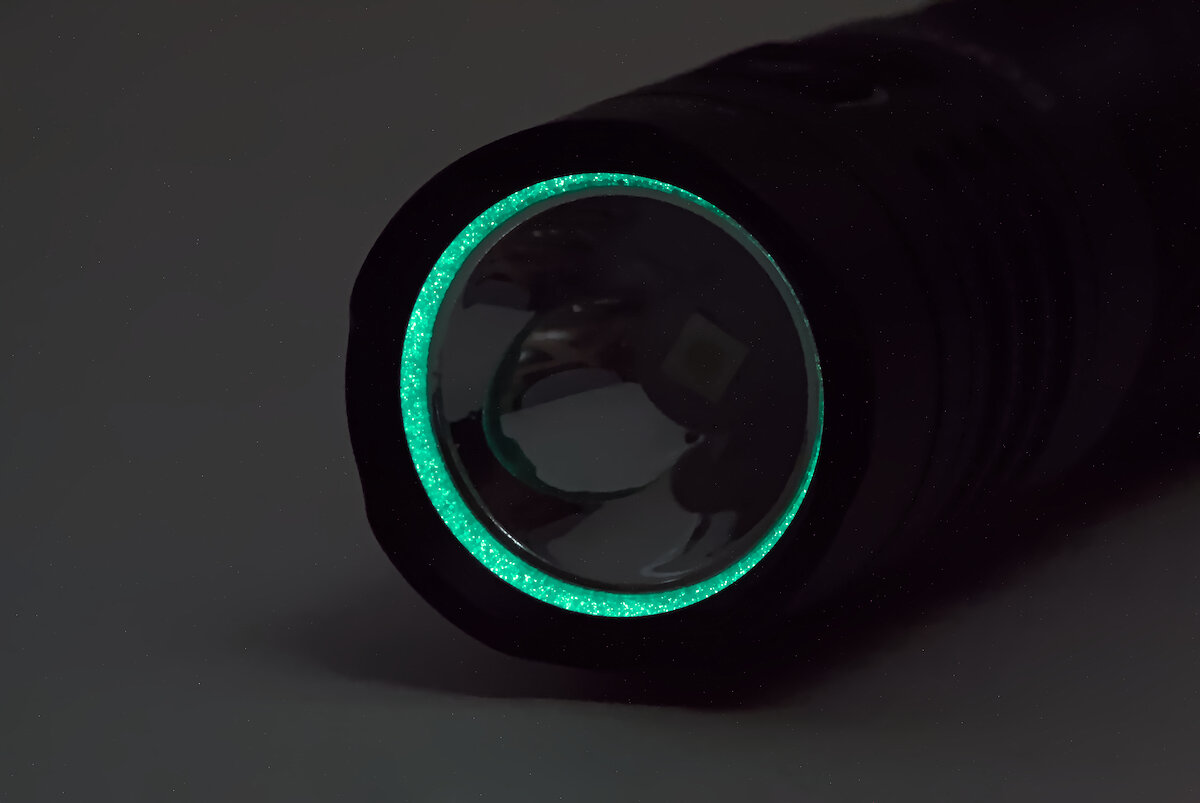
Here is a look at the light pattern. A powerful, very compact spot with a diffuse edge, surrounded by a uniform spill.
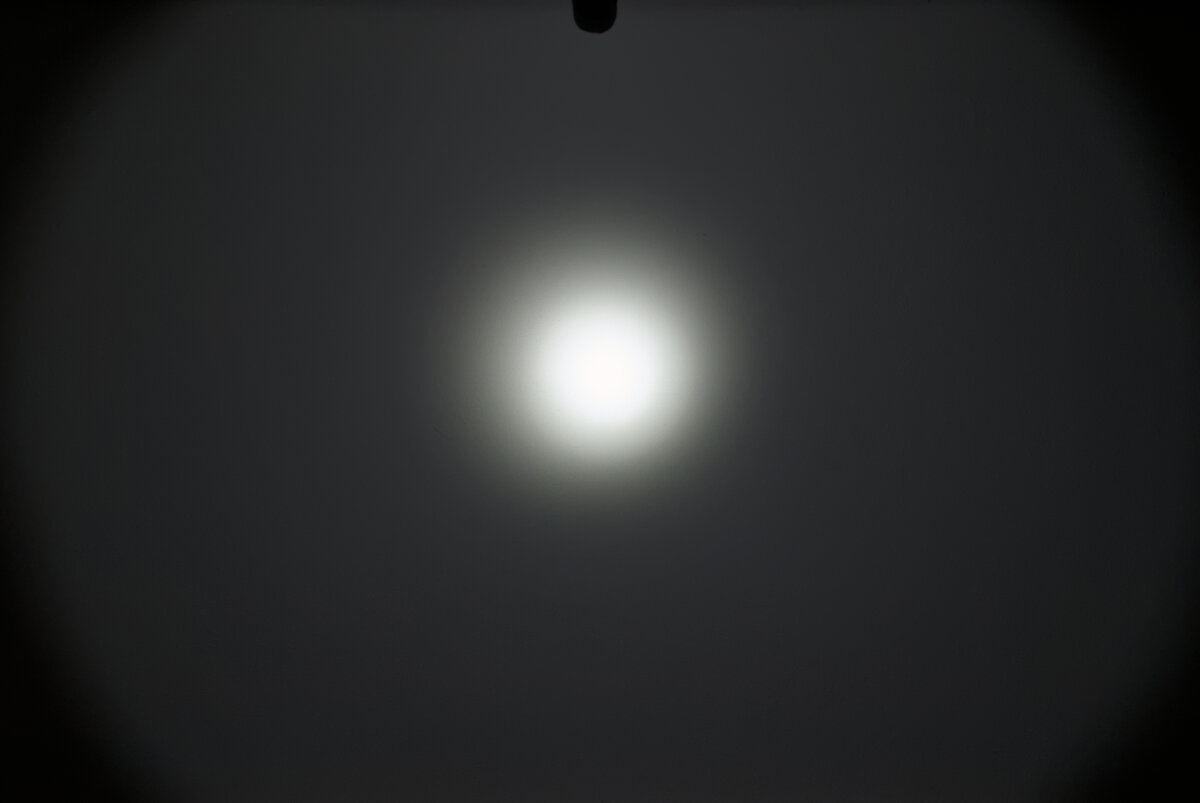
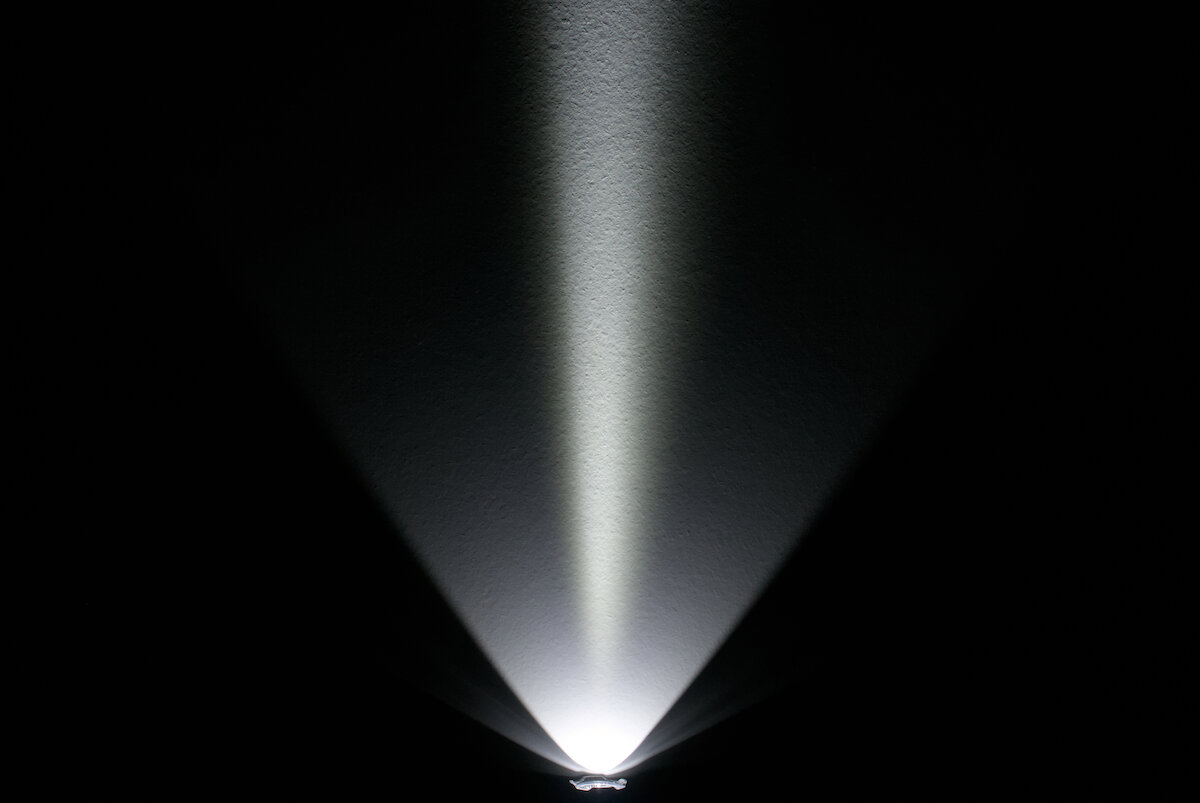
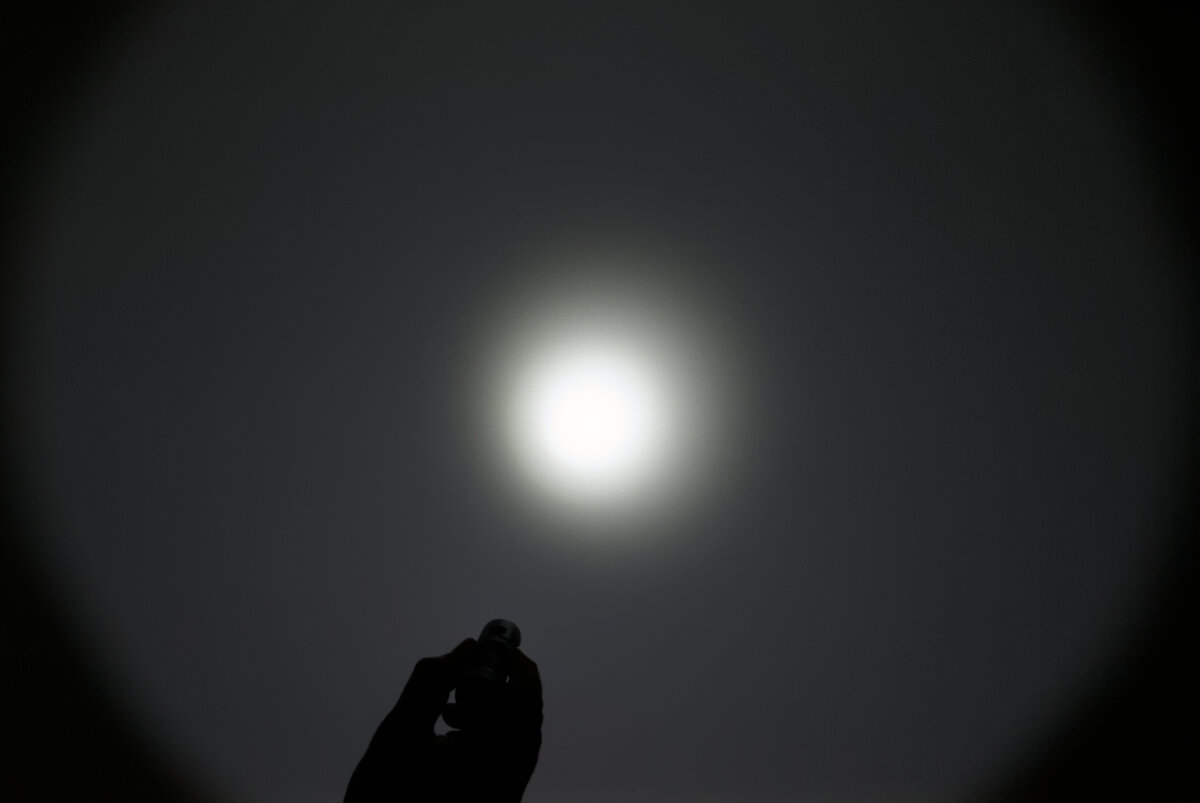
Clearly a flashlight for distances of around five meters or more. At shorter distances, the spot is simply too small for me. Pointed downwards directly in front of your feet, the spot only covers an area of around 15 cm in diameter.
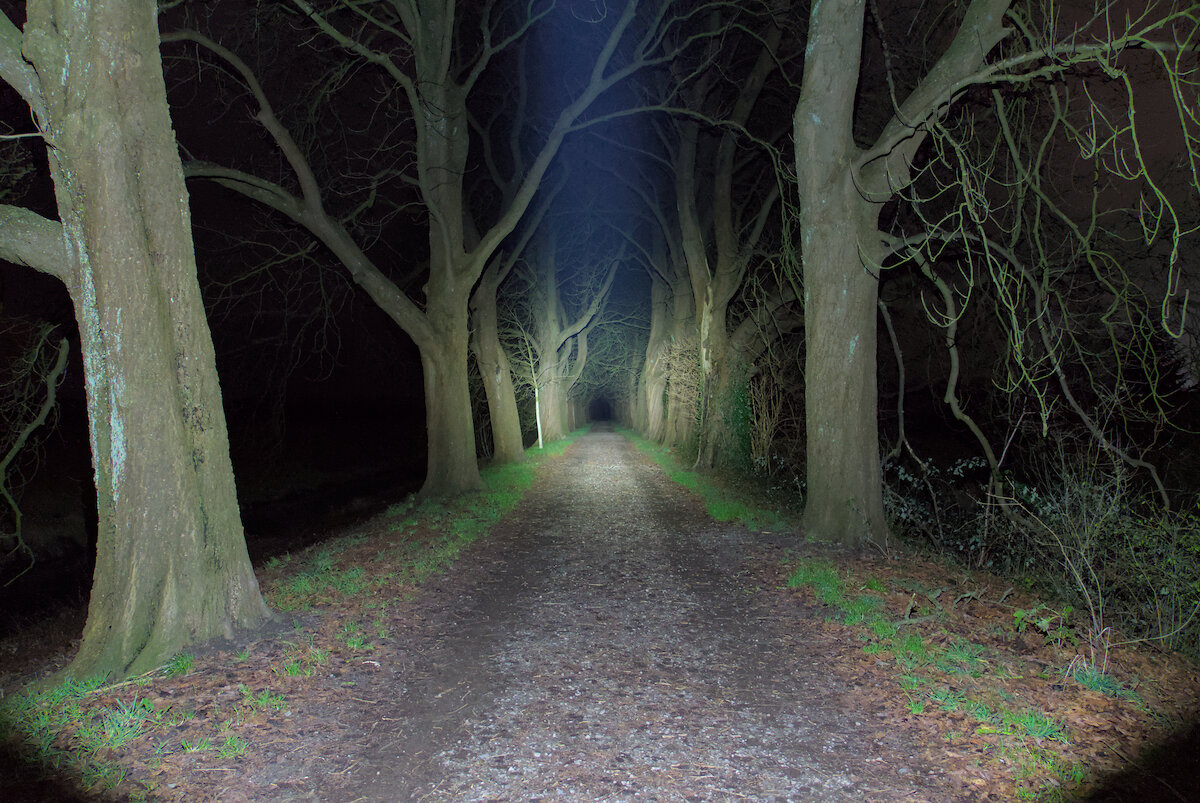
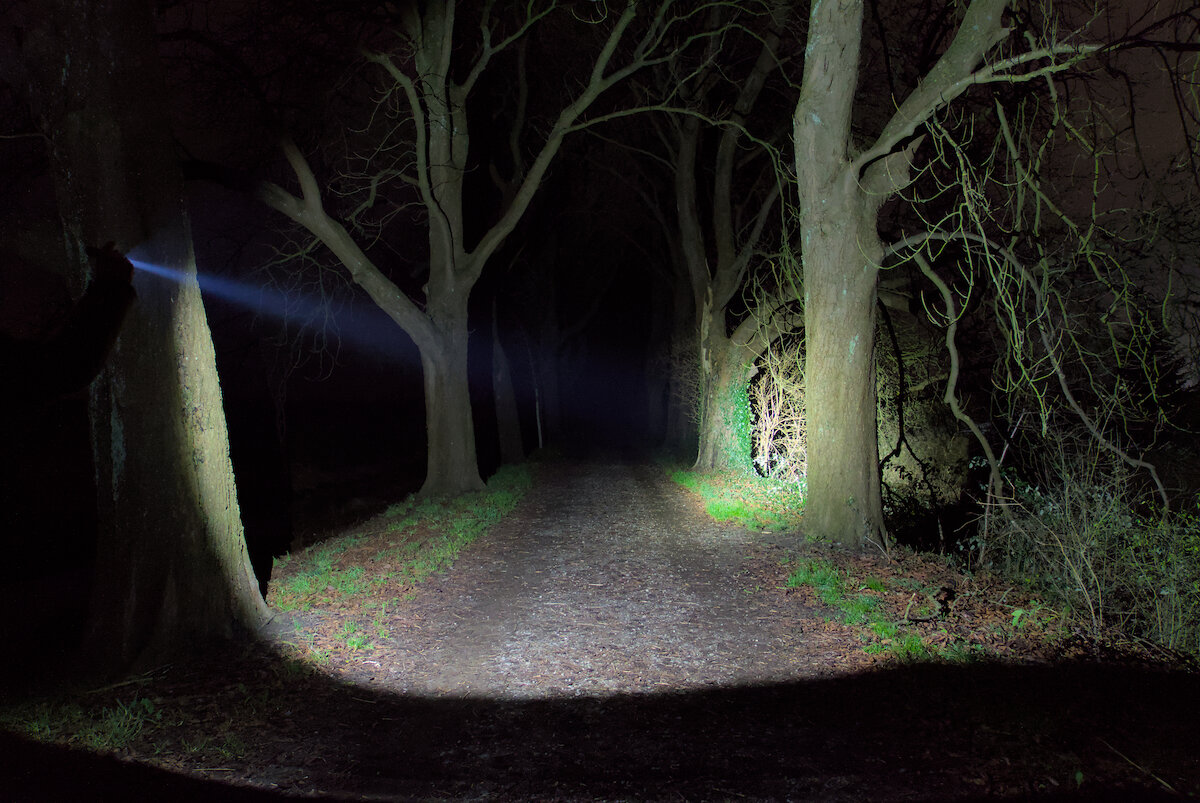
Driver and runtime
Thanks to a buck driver, the brightness remains mostly constant. To protect the flashlight from overheating, the brightness is reduced after a certain time in turbo mode, depending on the cooling.
| Mode | Brightness¹ | Runtime¹ | Intensity¹ (Throw²) | Current³ |
|---|---|---|---|---|
| Turbo | 1450 / 720 lm | 1.5 min + 1.5 h | 39 250 cd (396 m) | 4.50 A |
| High | 800 / 720 lm | 5 min + 2 h | 19 500 cd (279 m) | 1.61 A |
| Medium | 350 lm | 5.2 h | 8 525 cd (185 m) | 0.55 A |
| Low | 100 lm | 15 h | 2 675 cd (103 m) | 0.15 A |
| Eco | 10 lm | 120 h | 275 cd (33 m) | 0.02 A |
| Moon | 1 lm | 480 h | 15 cd (8 m) | < 0.01 A |
| Off | 32 µA |
¹ According to manufacturer ² ANSI FL1 ³ Measured
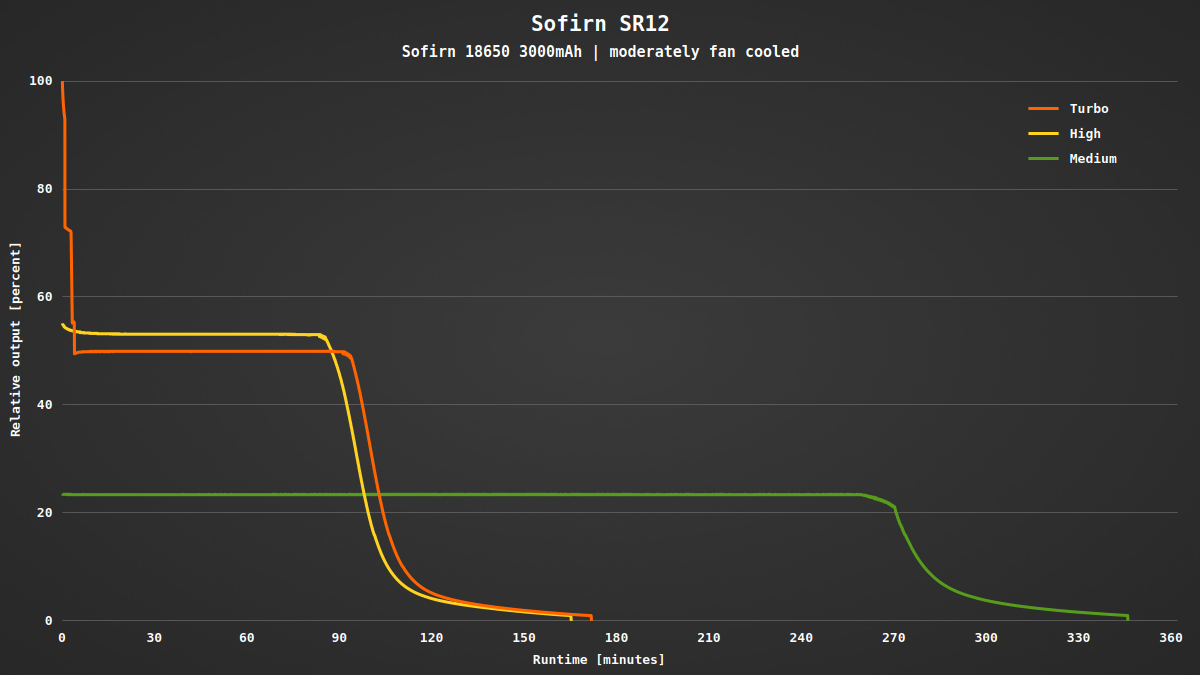
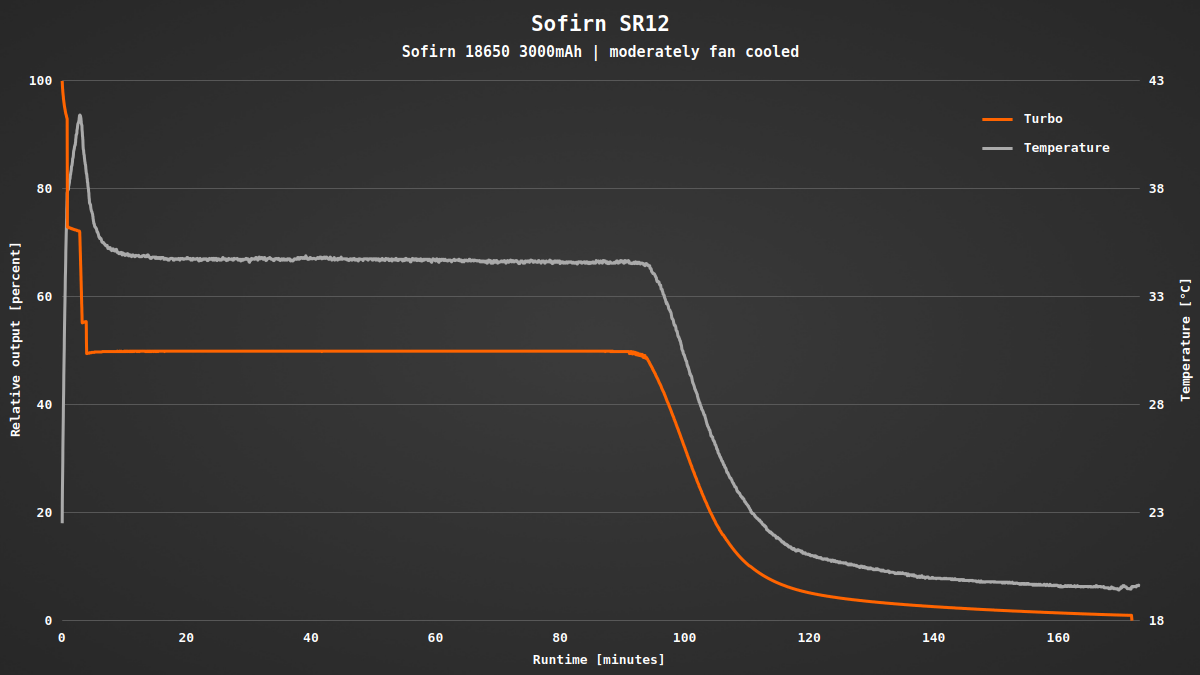
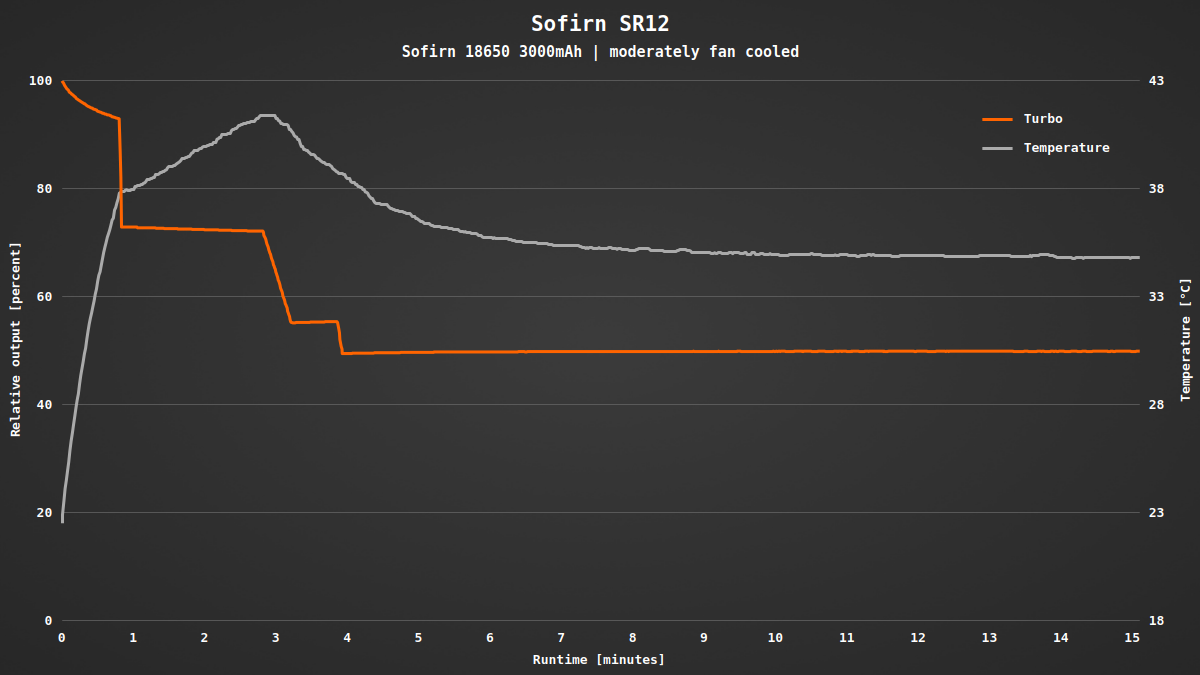
Testing with the oscilloscope has shown that the brightness is regulated in all levels without PWM.
If the battery voltage drops below 3.20 V, the status LED in the switch flashes red continuously during operation. At a voltage of 2.65 V the flashlight switches off to protect the battery from deep discharge.
Conclusion
Despite its slim head, the new Sofirn SR12 is a real thrower – the deep reflector and the Luminus SFT-25R make it possible. With a length of only 112 mm and a diameter of about 24 mm, it should still fit easily into your pocket, making it perfect as an EDC flashlight. It becomes even more interesting when combined with an optional short battery tube for 18350 batteries, which reduces its length to 79 mm.
Got curious? Here you can find the Sofirn SR12 on sofirnlight.com.
